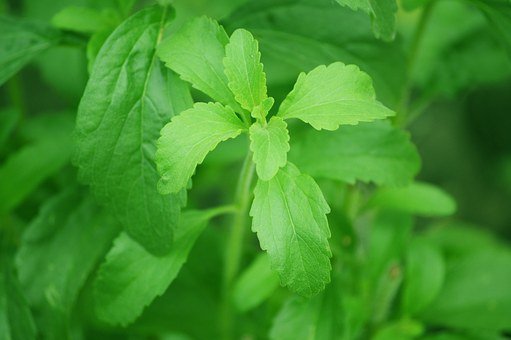Non-nutritive sweetener use in the United States has increased as obesity and body mass index, or BMI, trends have risen, according to research published in the January issue of the "American Journal of Clinical Nutrition." This increase in consumption, coupled with the growing concern for safety, has led many manufacturers to consider natural non-nutritive products to introduce to the market. In response to this demand, Stevia, a natural herb native to South America, hit the market and was approved by the FDA in 2008 for safe use in foods and beverages.
HOW IS STEVIA MADE?
Stevia rebaudiana is an herb that grows wild as a small shrub, predominately in South America. The glycosides, or sugar molecules, are extracted from the sweetest parts of the leaves to render a noncaloric, intensely sweet substance. Like many other non-nutritive sweeteners, only a small amount of Stevia is required to reach the desired taste. The International Food Information Council Foundation says Stevia sweeteners are 200 to 300 times sweeter than sugar.
WILL IT RAISE YOUR BLOOD SUGAR?
Stevia is considered a calorie-free, non-nutritive sweetener. Therefore, patients with blood glucose concerns, such as diabetes, may use Stevia with very little concern. Be aware, however, that the filler used in Stevia to create a fluffy white product that mimicks sugar contains about 3 g of carbohydrates per packet. If used in excess, Stevia may have the potential to raise blood sugar. The magnified sweetness of Stevia allows consumers to use less product, contributing to lowered concerns for blood glucose elevation.
ARE THERE ADDITIONAL HEALTH BENEFITS?
The use of Stevia offers additional health benefits for its consumers aside from glucose tolerance. Substituting Stevia for sugar allows consumers to enjoy the sweet taste they prefer at minimal calories. This benefit allows consumers to enjoy Stevia on a weight-loss or weight-maintenance plan. Stevia-based sweeteners also are considered to be noncariogenic and do not promote tooth decay and cavities. Take note, however, that food products containing Stevia may possess carbohydrates or other calorie-containing ingredients.

WHAT PRODUCTS CONTAIN STEVIA?
Non-nutritive Stevia substitutes available on the market include Truvia, PureVia, Sun Crystals and Sweet Leaf. Other food or beverage products available in the United States for purchase include Crystal Light Pure, Vitamin Water Zero, Minute Maid Pomegranate Tea, Sprite Green, Yo Crunch 100 Calorie Packs, SoBe Lifewater and SweetLeaf Tea.